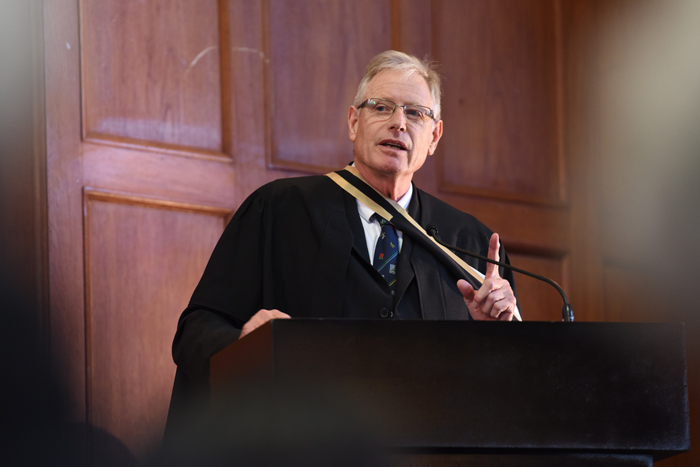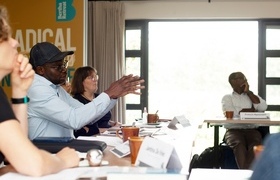Let us pay homage to the students of 1976'
13 June 2016 | Story by Newsroom
With Sam Nzima's iconic photograph of a dying Hector Pieterson as a backdrop, Charles Nupen reminded some 410 Humanities graduands on 10 June that the class of 1976 had left a formidable legacy that needs to be upheld.
Before Nupen spoke, the Black Roots Marimbas had the audience jiving to the Kaapse Klopse classic “Welcome to Cape Town” as the academic procession filed into the hall, and UCT soprano Goitsemang Lehobye wowed the crowd with a rendition of “My Fair Lady”.
Professor Danie Visser, deputy vice-chancellor and master of ceremonies, congratulated the graduands for making it through a tough 2015.
“Last year was a year of new thinking, new learning, and you had to write under difficult conditions,” said Visser. “I'm sure that you are grateful that you were at university last year, at such a momentous time.
“We are on the threshold of 40th anniversary of June 16 as the images outside and on the wall remind us,” said Visser, adding that the university would formally remember the students who fought for South Africa's freedom on 14 June.
A history of activism
Nupen is no stranger to student politics, having been involved with the Wages Commission at the University of Natal before being elected president of both the SRC and of the National Union of South African Students in the early 1970s. He was arrested more than once for delivering a workers' newspaper called Isisebenzi (The Worker), which he and fellow students had co-founded.
His legal career began in 1979 at the Legal Resources Centre in Johannesburg, where he worked an attorney, defending people who had been charged with pass-law offences. By 1984 he was the executive director of the Independent Mediation Service of South Africa (IMSSA), which conducted political mediation.
He left IMSSA in the mid-1990s to assist in establishing the Commission for Conciliation, Mediation and Arbitration (CCMA), South Africa's first national public dispute settlement agency.
'No surprise that students question orthodoxies'
“Next week marks the 40th anniversary of the student uprising in Soweto. It represents the most remarkable example of student activism in our history. … In truth, our universities have been sites of struggle for nigh on 60 years, since 1959, when the apartheid government segregated our universities,” said Nupen.
Universities had always fostered critical thinking. So, it was no surprise that there would emerge among students a propensity to question orthodoxies, said Nupen.
The 1960s and 1970s were “dark days” for the country. Yet in the face of all this, Nupen said, schoolchildren in Soweto, in an extraordinary act of courage, took on the apartheid state and changed the course of our history, laying the foundation for South Africa's freedom.
Bantu education begins crumbling
Being forced to teach in Afrikaans, teachers began resigning en masse in the 1970s. In 1976, students started boycotting classes, said Nupen.
On 13 June, SASM [the South African Students' Movement] leaders organised a protest march through the streets of Soweto to raise the profile of their struggle.
They sang “Senzeni na” and “Nkosi sikelel' iAfrika” and converged peacefully on Orlando West Secondary School. A throng of between 10 000 and 20 000 students gathered, and were confronted by riot police. A police dog was unleashed. Students were bitten. They seized the dog and killed it. That's when the police started shooting.
“This country has seen some horrific violence by police against its people,” he said, pointing to Sharpeville and Marikana. “But there is something particularly insidious about firing live ammunition on unarmed children.”
“Who can forget that iconic picture of Hector Pieterson, taken by Sam Nzima?” he asked, pointing to the picture behind him.
Those killings triggered a chain of events that culminated in mass resistance to apartheid.
“Overnight, students were conscientised to escalate their campaign from anti-Afrikaans to the end of Bantu education and the end of apartheid.”
The regime's response was swift and brutal. Killings of student leaders escalated that year.
“The government acknowledged that nearly 600 people had died. Independent researchers put this number at nearly 3 000.”
Schools emptied. Many student leaders fled into exile – some joining the ANC, some being tried for treason and being sent to Robben Island.
“For them, their education was permanently disrupted. Far too many paid the ultimate price.”
But they had struck down Afrikaans, subverted the apartheid machine and laid the foundation for its fall.
Prisoners on Robben Island gained inspiration from the students' courage and conviction, said Nupen, relating former president Nelson Mandela's words. He also mentioned Ahmed Kathrada, who said that when people saw the students gather unarmed on the streets of Soweto, their conviction to take up the struggle was fortified.
“The point I want to make is that in no small measure it contributed to our constitutional democracy, which gives rise to our freedoms and our right to organise and fight for what is right.
Our country faces new but no less compelling challenges to what it faced at that time, concluded Nupen, and the students should be at the forefront of that struggle.
Story Yusuf Omar. Photo Michael Hammond.
Watch the recorded ceremony:
See a selection of pictures from social media:
 This work is licensed under a Creative Commons Attribution-NoDerivatives 4.0 International License.
This work is licensed under a Creative Commons Attribution-NoDerivatives 4.0 International License.
Please view the republishing articles page for more information.










